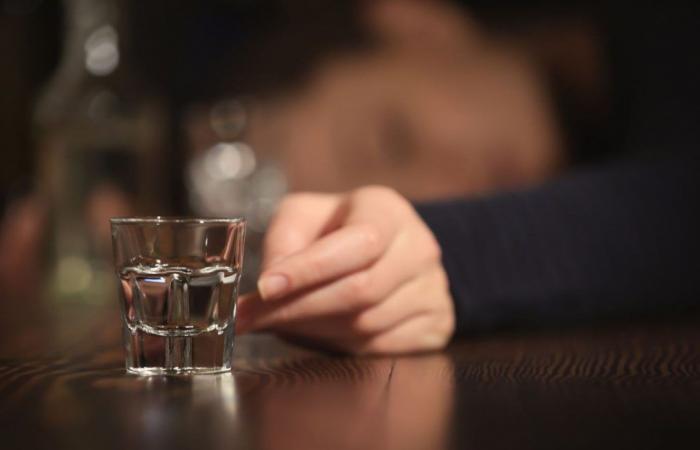
One evening, Caroline decides to find the man with whom she has been talking for a week on a dating application. He invites her to his house. “The contact was very pleasant, I was at ease. » The man then takes out two “huge” glasses of wine. The mother explains that she will only drink one. “I had a 45-minute drive home and I was working the next day, so I planned to be home before midnight. » They discuss. The current is flowing well. “Without seeing it, I found myself with a second glass, as full as the first. And then he kissed me. » Caroline asks him to stop and starts to feel very bad. “I was hot, sick to my stomach and felt oppressed. » Then everything becomes blurry. His only memory: vomiting numerous times.
The next morning, the man proudly tells him: “there is still the mark of your butt on the table”. Then: “Luckily the neighbor didn’t come by at that time because I hadn’t closed the bay window and you seemed to be having fun.” Caroline stiffened. “I had no memory of that moment. » The forty-year-old takes her things and flees. A few hours later, she told the story to two friends who thought she had been drugged. However, no psychoactive substance was found in Caroline’s body, whose testimony was collected by the Paris addictovigilance center. She was therefore not a priori a victim of chemical submission, like Gisèle Pelicot, but of chemical vulnerability.
In more than a third of rapes, the victim had consumed alcohol
“Chemical vulnerability is when an attack occurs after the voluntary consumption of a psychoactive substance by the victim,” summarizes Doctor Leila Chaouachi, pharmacist at the Paris addictovigilance center and expert in the national survey on chemical submission. of the ANSM. In 90% of cases, the victim consumed alcohol or cannabis. » Blackout, nausea, vomiting… These substances have effects similar to those used for chemical submission. “This is the reason why, very often, victims think that they have been drugged,” continues the pharmacist.
Although chemical vulnerability receives very little media coverage, the cases are far from rare**. Laurent Bègue-Shankland, addictologist and professor at Grenoble Alpes University, has just released a study on the role of alcohol and cannabis in sexual violence among students. He interviewed 67,000 between 2023 and 2024. In almost half of attempted sexual assaults (47.5%) and more than a third of rapes (37%), the victim had consumed alcohol. And the figures show it: the more victims drank, the higher the risk of rape.
A modus operandi of the attacker
This data is not trivial. Because whether it’s submission or chemical vulnerability, the logic is the same: the attacker will take advantage of the victim’s state to take action. “In both cases, she is never responsible for her aggression,” insists the doctor. Working for LeCRAFS, a telecounseling system specializing in attacks facilitated by substances, Leila Chaouachi regularly has victims of chemical vulnerability on the phone. And she spotted several operating modes.
“The first is the vulnerability of opportunity. An attacker sees that the victim is in a fragile state and takes action, she explains. He knows that she is in no condition to react or express her consent. » This is what happened to Solène*, a 30-year-old Parisian.
A vulnerability of opportunity or predation
During a student party in an apartment about ten years ago, she chatted with a young man. They flirt a little, have fun, drink and smoke cannabis. “When I went to bed, he actually came over to me and raped me. With the alcohol, the highs and the shock, I was unable to move, but I am convinced that he saw my tears flow,” she says, still traumatized ten years later. “Who wants to fuck someone unconscious?” Seriously ? It’s disgusting! » It took a while for the young woman to remember this evening. But since the first flashback, she has never been able to get back into a relationship with a man. She “can no longer trust them.”
Attackers can also use chemical vulnerability in a proactive and premeditated manner, as was the case for Caroline whose disproportionately large glass was filled without her asking. Leila Chaouachi calls this mode of operation a “predation” vulnerability. “The person is strongly encouraged to drink alcohol, for example, a strategy to facilitate the act,” explains the pharmacist. This is particularly the case with drinking games. »
“If the person feels bad, we are supposed to take care of them, not rape them”
And the attackers can implement an even more chilling modus operandi. “Some do rounds, during which they go to pick up the most vulnerable person in the evening to bring them home,” explains Leila Chaouachi. This is what we call “the broom car”, described in the book investigation The night of men, by Félix Lemaître. »
In the end, the desire of the attackers is always the same: to look for easy “prey”. “If a woman is drunk, feels bad, can no longer stand, vomits, we are supposed to take her to a safe place and take care of her, not rape her,” recalls Leila Chaouachi. This seems obvious, but it is far from being the case.”





